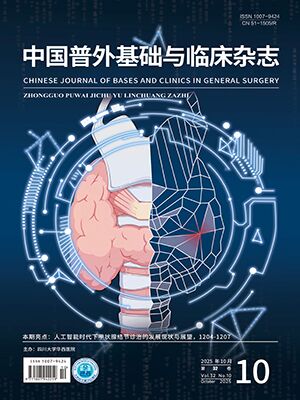| 1. |
Swank GM, Deitch EA. Role of the gut in multiple organ failure: bacterial translocation and permeability changes 〔J〕. World J Surg,1996; 20(4)∶411.
|
| 2. |
Vincent JL. Prevention and therapy of multiple organ failure 〔J〕. World J Surg,1996; 20∶465.
|
| 3. |
Sauaia A, Moore FA, Moore EE, et al. Early risk factors for postinjury multiple organ failure 〔J〕. World J Surg,1996; 20∶392.
|
| 4. |
Hebra A, Hong J, McGowan KL, et al. Bacterial translocation in mesecteric ischemiareperfusion injury is dysfunctional motility the link〔J〕? Pediatric Surg,1994; 29(2)∶280.
|
| 5. |
Marshall JC. The gut as a potential trigger of exerciseinduced inflammatory responses 〔J〕. Can J Physiol Pharmacol,1998; 76(5)∶479.
|
| 6. |
Landow L, Andersen LW. Splanchnic ischemia and its role in multiple organ failure 〔J〕. Acta Anaesthesiol Scand, 1994; 38(7)∶626.
|
| 7. |
Beuk RJ, Heineman E, Tangelder GJ, et al. Effects of different durations of tatol warm ischemia of the gut on rat messnteric microcirculation 〔J〕. J Surg Res,1997; 73(1)∶14.
|
| 8. |
Charpentier C, Audibert G, Dousset B, et al.Is endotoxin and cytokine release related to a decrease in gastric intramucosal pH after hemorrhagic shock 〔J〕? Intensive Care Med,1997; 23(10)∶1040.
|
| 9. |
Morales J, Kibsey P, Thomas PD, et al. The effects of ischemia an ischemiareperfusion on bacterial translocation, lipid peroxidation, and gut histology: studies on hemorrhagic shock in pigs 〔J〕. J Trauma, 1992; 33(2)∶221.
|
| 10. |
Nieuwenhuijzen GA, Deitch EA, Goris RJ. The relationship between gutdervied bacteria and the development of multiple organ dysfunction syndrome 〔J〕. J Anat,1996; 189(3)∶537.
|
| 11. |
Nieuwenhuijzen GA, Deitch EA, Goris RJ. Infection, the gut and the development of the multiple organ dysfunction syndrome 〔J〕. Eur J Surg, 1996; 162(4)∶259.
|
| 12. |
EavesPlyles T, Alexander JW. Rapid and prolonged impairment of gut barrier function after thermal injury in mice 〔J〕. Shock, 1998; 9(2)∶95.
|
| 13. |
Grotz MR, Deitch EA, Ding J, et al.Intestinal cytokine response after gut ischemia:role of gut barrier failure 〔J〕. Ann Surg,1999; 229(4)∶478.
|
| 14. |
Yassin MMI, Barros AAB, Parks TG, et al.Lower limb ischaemiareperfusion injury alters gastrointestinal structure and function 〔J〕. Br J Surg,1997; 84∶1425.
|
| 15. |
Tamion F, Richard V, Lyoumi S, et al. Gut ischemia and mesenteric systhesis of inflammartory cytokines after hemorrhagic or endotoxic shock 〔J〕. Am J Physiol, 1997; 273(Pt 1)∶G314.
|
| 16. |
Sorkine P, Szold O, Halpem P, et al.Gut decontamination reduces bowel ischemiainduced injury in rats 〔J〕. Chest, 1997; 112(2)∶491.
|
| 17. |
Mishima S, Xu Dazhong, Lu Qi, et al. Bacterial translocation is inhibited in inducible nitroxide synthase knockout mice after endotoxin challenge but not in a model of bacteri overgrowth 〔J〕. Arch Surg, 1997; 132∶1190.
|
| 18. |
Hotokezaka M, Mentis EP, Patel SP,et al. Recovery of gastrointestinal tract motility and myoelectric activity change after abdominal surgery 〔J〕. Arch Surg,1997; 132(4)∶410.
|
| 19. |
Udassin R, Eimerl D, Schiffman J, et al.Postischemic intestinal motility in rat is inversly correlated to length of ischemia:an in vivo animal model.〔J〕 Dig Dis Sci, 1995; 40∶1035.
|
| 20. |
Tumage RH, Kadesky KM, Rogers T, et al.Neutrophil regulation of splanchin blood flow after hemorrhagic shock. 〔J〕 Ann Surg,1995; 222(1)∶66.
|
| 21. |
Walley KR, Friessen BP, Humer MF, et al.Small bowel tonometry is more accurate than gastric tonometry in detecting gut ischemia 〔J〕. J Appl Physiol,1998; 85(5)∶1770.
|
| 22. |
Bengmark S, Gianotti L. Nutritional support to prevent and treat multiple organ failure 〔J〕. World J Surg,1996; 20∶474.
|
| 23. |
Rowlands BJ, Gardiner KR. Nutritional modulation of gut inflammation 〔J〕. Proc Nutr Soc, 1998; 57(3)∶395.
|
| 24. |
Wang XD, Soltesz V, Andersson R. Cisapride prevents enteric bacterial overgrowth and translocation by improvement of intestinal motility in rats with acute liver failure 〔J〕. Eur Surg Res,1996; 28∶402.
|
| 25. |
Spapen HD, Duinsiaeger L, Diltoer M, et al. Gastric emptying in critically ill patients is accelerated by adding cisapride to a standard enteral feeding protocol: results of a prospective, randomized, controlled trial 〔J〕. Crit Care Med,1995; 23(3)∶481.
|




